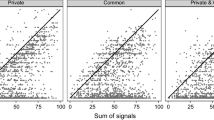Summary.
We study contests where the set of players is a random variable. If it is known for certain that there will be at least one participant, then aggregate contest expenditure in equilibrium is strictly lower in a contest with population uncertainty than in a non-uncertain contest with the same expected number of players. This suggests an explanation of, for example, why empirical studies show rent-seeking expenditures to be much lower than predicted by other theories.
Similar content being viewed by others
Author information
Authors and Affiliations
Corresponding author
Additional information
Received: 29 June 2003, Revised: 14 December 2004,
JEL Classification Numbers:
C72, D44, D72, D82, K41.
Correspondence to: Karl Wärneryd
Rights and permissions
About this article
Cite this article
Myerson, R.B., Wärneryd, K. Population uncertainty in contests. Economic Theory 27, 469–474 (2006). https://doi.org/10.1007/s00199-004-0605-2
Issue Date:
DOI: https://doi.org/10.1007/s00199-004-0605-2



